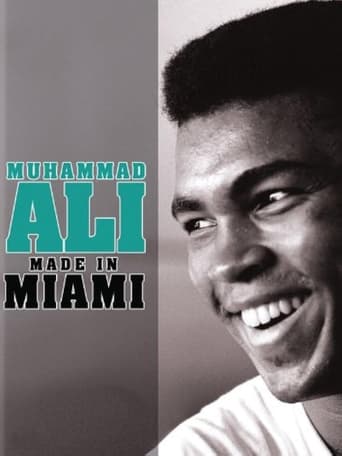Interesteg
What makes it different from others?
TrueJoshNight
Truly Dreadful Film
Titreenp
SERIOUSLY. This is what the crap Hollywood still puts out?
Billy Ollie
Through painfully honest and emotional moments, the movie becomes irresistibly relatable
MartinHafer
This documentary features lots of archival footage and interviews with Ali's trainer, fight doctor and many others who have known him. Ali himself is not interviewed--perhaps this has to do with his illness. I do think having him discuss his life would have made this a much more interesting film but can understand that he probably was not available, able or willing to participate and you work with what you have.While the title of this documentary is "Made in Miami", this is a bit misleading. Although the show does talk a bit about Miami specifically, this was not the focus throughout the film. It really was about Cassius Clay/Muhammad Ali from his early years as a professional boxer until he became champion and refused induction into the military--and then the rest of his career was QUICKLY explored. Much of this had absolutely nothing to do with Miami. In fact, I think the film's focus was the major problem. While it was engaging and interesting, the Miami aspect should have been longer and more fully explored OR the title should have been changed and the film should have been a biography that was a minimum of two to three hours in length. That's because it just ZOOMED past the viewer at the end--with too much material at once. Fascinating but quite flawed.
invictorious
It was a boxing gym, but trainer, Angelo Dundee, called it "The Theater" for his then young protégé, Cassius Clay. On his way to becoming a champion and transcending the sport while becoming Muhammad Ali, Clay honed his craft at Miami's 5th Street Gym. Fresh off winning an Olympic gold medal in Rome, the Louisville-born pugilist moved to Miami to train for his professional career.In what could be a documentary by itself, Ali's relationship with Malcolm X, the Nation of Islam, and its founder, Elijah Muhammad, is included as a testament to his growing social consciousness. It was Muhammad who bestowed the name the new champion would reveal soon after his February 1964 victory over Sonny Liston. Liston, a background actor on the stage that is the life of Muhammad Ali, is given some mention, including a back-story. This presentation ends soon after Ali lost the title because of his refusal to fight in the Vietnam War.

